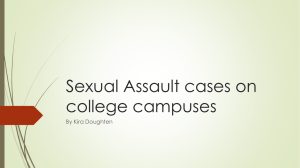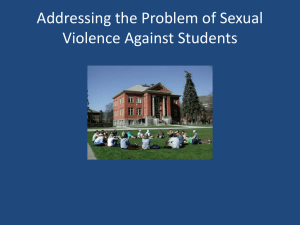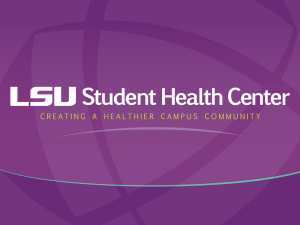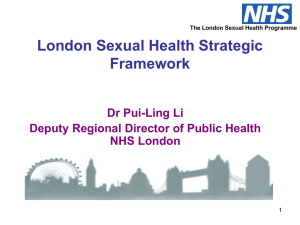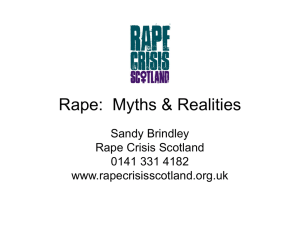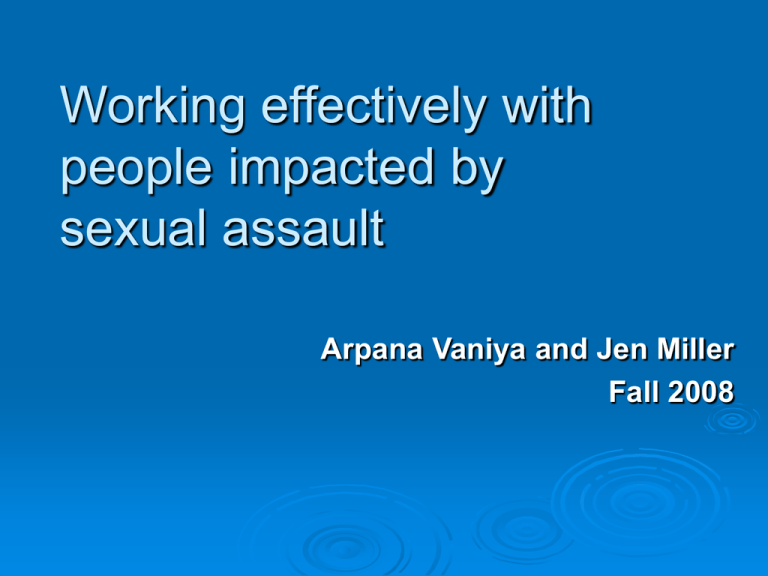
Working effectively with
people impacted by
sexual assault
Arpana Vaniya and Jen Miller
Fall 2008
Who we are
Arpana Vaniya
Intern, AVC/DOS Office
Women's Studies Major
Jen Miller
Student Development Educator
AVC/Dean of Students Office
(New Student Commons 381)
2-5000
Why we are here today
You
have already learned the definitions
and laws in regards to sexual
violence/violation
Our goal is to help you feel prepared to
work effectively and sensitively with
sexual assault survivors, witnesses,
and/or alleged perpetrators
Why is care so important during hearings
involving sexual assault survivors?
“Grace”-Kathleen Hulka, Director and Producer
The story follows the lives of three women: a
young aspiring ballerina, a twenty-something
career woman and an elderly grandmother as
they all become survivors of sexual assault.
Grace is a tribute to the female spirit and its
ability to triumph over violation, betrayal and
disrespect.
This film was made by a student in 2007 who
had two friends who were sexually assaulted
during their time at a college.
http://www.mediathatmattersfest.org/7/index.php
?id=10
Why we are here today
During the course of their college careers
women are 4 times more likely to be sexually
assaulted (www.rainn.org/statistics)
Every 2 minutes someone in the U.S. is sexually
assaulted. (www.rainn.org/statistics)
The
reality at UCR is that sexual assaults
have occurred (and could occur again) on
our campus
60% of sexual assaults are
not reported to the police
(www.rainn.org/statistics)
Sexual
assaults remain drastically
underreported crimes
If a UCR student makes the difficult
choice to report a sexual assault to
the Student Conduct & Academic
Integrity Programs office, we want
you to feel prepared to work with the
parties involved with care
Why sexual assaults
are often unreported?
Fear of not being believed
Negative treatment/attitude by police/officials
Survivors might consider their relationship with
the alleged perpetrator
Evidence collection-SART exams
Length of court process
Concern about family and friends
You can help as a member of the Student
Conduct Committee to make the process a bit
easier!
What is a sensitive crime?
“When we speak of "sensitive crimes" we are
talking about crimes that require a little more
sensitivity to be handled appropriately. Often
these fall into the categories of sexual assault,
rape, domestic violence, or other incidents
where there is a strong emotional element
involved”
http://www.amherst.edu/~campuspolice/sexual_assault.html
Why sensitivity is important for the
conduct process…
The topic of sexual assault involves emotions
and sometimes traumatic experiences. These
are hard things to share with a big group of
people
A comfortable environment will help you to get
the information that you need for your hearing
with minimal emotional impact on the reporting
parties
Listening, offering comfort, and avoiding blaming
language and/or questions is critical when
working with people impacted by a sexual
assault
Our own bias’ could influence our reactions to
the information presented
A note on language
We
prefer to use the term “survivor”
verses “victim” when discussing a person
who has been sexually assaulted
For our roles, we prefer “survivor” due to
the word’s empowering connotations
Student Conduct & Academic Integrity
Programs will be training you on the
language that they prefer for you to use
during committee reviews
To keep you on your toes…
A quiz
What are the chances that a woman
will be a survivor of a sexual assault
in her lifetime?
1
in a 1000
1 in a 100
1 in 50
1 in 3
What are the chances that a woman
will be a survivor of a sexual assault
in her lifetime?
1
in a 1000
1 in a 100
1 in 50
1 in 3
Where do the greatest number of
sexual assaults occur?
Home
or apartment
Dark alley
Park or beach
A car
Where do the greatest number of
sexual assaults occur?
Home
or apartment
Dark alley
Park or beach
A car
How long does the average
sexual assault last?
20 to 40 minutes
40 to 60 minutes
1 to 2 hours
2 to 4 hours
How long does the average
sexual assault last?
20
to 40 minutes
40 to 60 minutes
1 to 2 hours
2 to 4 hours
What percentage of the time does the
survivor and the alleged perpetrator know
each other?
10%
25%
50%
90%
What percentage of the time does the
survivor and the alleged perpetrator know
each other?
10%
25%
50%
90%
What percentage of sexual assaults
occur in a dating situation?
10%
25%
50%
75%
What percentage of sexual assaults
occur in a dating situation?
10%
25%
50%
75%
For more information regarding the
information presented by the quiz…
http://www.rainn.org/
http://www.takebackthenight.org/
http://www.advocatesforyouth.org/
http://www.usdoj.gov/dea
http://www.fda.gov/
http://www.drugabuse.gov/
College campuses
A national study that polled over 6,100 women at
32 college campuses of higher education
revealed:
95% of rapes on college campuses are not reported
1 in 6 women had been raped or had experienced
attempted rape during the previous year
27% of the women polled experienced attempted
intercourse by threat and/or force
http://www.rainn.org
College campuses (cont)
In another study of acquaintance rape on
college campuses, it was found that:
1 out of 9 college women had been raped
8 out of 10 survivors knew their attacker
However, less than 5% reported the crime
http://www.rainn.org
College campuses (cont)
The American Association of University
Women reported that:
43% of college-aged men conceded to
using coercive behavior to have sex but
denied that it was rape
13 times as many rape survivors are more
likely to attempt suicide than are people
who are not survivors of rape
http:// www.rain.org
Working with people impacted by
sexual assaults can be difficult
The
survivor might be confronting a
friend, partner and/or family member
The people involved in the hearing might
be experiencing post traumatic stress
disorder
Event details might be unclear
Confronting people you know
Continued Trauma: Because the alleged
perpetrators are often known to their
survivors and are often someone with
whom they socialize. Survivors of
acquaintance rape often have to
encounter their alleged assailants after the
rape. Fear of such encounters can cause
increased distress and humiliation for the
survivors
http://www.rainn.org/
Emotional reactions
Changed relationships
Anxiety
Shock
Intense fear
Depression
Betrayal
Fundamental loss of trust
Disruption of daily life
Loss of control
Disbelief
Denial or minimization
Flashbacks
Disorientation
Guilt and self-blame
Anger
Isolation
Vulnerability
Sexual intimacy concerns
Post traumatic stress disorder
Post Traumatic Stress Disorder (PTSD) is a
normal human reaction to an extreme or
abnormal situation. Each person has a different
threshold for what is perceived as a traumatic
event. PTSD is not a rare or unusual
occurrence, in fact, many people experience
PTSD as a result of a traumatic experience such
as rape or sexual assault.
http://www.rainn.org/
Post traumatic stress disorder
A person may be experiencing PTSD following an event
where they experienced and/or were threatened
emotionally and/or physically:
show symptoms of intense horror, helplessness, or fear
experience distressing memories of the event (e.g.,
flashbacks, including nightmares)
regularly avoid things or triggers that remind them of the
event (e.g., people, places, things, etc.)
show significant impairment or distress due to the event
show at least two symptoms of increased arousal (e.g.,
sleep difficulties, difficulty concentrating, hyper vigilance,
an exaggerated startle response, or irritability or
outbursts of anger/rage)
http://www.rainn.org
Drug facilitated sexual assaults
Drug Facilitated Sexual Assault: When
drugs or alcohol are used to compromise
an individual's ability to consent to sexual
activity. In addition, drugs and alcohol are
often used in order to minimize the
resistance and memory of the survivor of a
sexual assault
www.911rape.org
Drug facilitated sexual assaults
Alcohol: Alcohol is the most commonly
used chemical in drug facilitated sexual
assaults. In large part this is due to the
fact that alcohol is easily accessible and a
chemical that many people use in social
interactions
www.911rape.org
Alcohol
Alcohol is found to be involved in 84% of all
acquaintance rapes.
An intoxicated partner cannot legally give
consent. Intoxication does not provide a legal
defense in cases of rape and sexual coercion.
Consent can not be provided when alcohol is
consumed regardless of blood alcohol content
(BAC)
http://www.ncsu.edu/health_promotion/Relationship/consent.html
Alcohol
Effects on the survivor:
Ability to protect himself or herself is reduced
Impaired judgment
May not realize that a situation has become dangerous
May have trouble handling or avoiding conflict
Perceptions of others not as clear
Difficult to set limits
Ability to resist, both physically and verbally, may be impaired
Effects on the alleged perpetrator:
May misinterpret the behaviors of another as sexual interest. May feel
justified to force himself or herself on a drunken partner because he/she
views the drunken partner as being partially responsible for whatever
happens.
May become increasingly aggressive and assertive
www.911rape.org
Drug facilitated sexual assaults
Rohypnol: A small white tablet that looks a lot like aspirin. It quickly
dissolves in liquid and can take effect within 30 minutes of being
ingested. The effects peak within 2 hours and may have lingering
effects for 8 hours or more
Effects:
Increased blood pressure
Memory impairment
Muscle relaxation
Drowsiness
Visual disturbances
Dizziness
Confusion
Unconsciousness
Nausea/aspiration on own vomit
www.911rape.org
Drug facilitated sexual assaults
GHB: Pure GHB is commonly sold as a clear, odorless liquid or white
crystalline powder. Because it is made in home labs the effects are often
unpredictable. Once ingested, GHB takes effect in approximately 15
minutes and can last 3-4 hours
Effects
Sedation of the body
Intense drowsiness
Hampered mobility
Verbal incoherence
Slowed heart rate
Nausea, aspiration on own vomit
Headache
Respiratory failure
Unconsciousness
Seizure-like activity
Coma, death
www.911rape.org
Drug facilitated sexual assaults
Benzodiazepines: Commonly prescribed as antianxiety and sleeping medications in the United
States, these drugs can be put into an alcoholic
drink or soft drink in powder or liquid form.
These are legal forms of Rohypnol
Effects: Benzodiazepines can markedly impair and
even abolish functions that normally allow a
person to resist, or even want to resist, sexual
aggression or assault
www.911rape.org
GHB, GBL, Rohypnol, &
Benzodiazepines:
For all of these drugs, alcohol increases the effects
All four of these drugs have some common effects that
make them appealing to alleged perpetrators. Their
sedative effect teamed with the drugs’ memory
impairment qualities make them a common weapon of
sexual assault
They are typically odorless, colorless, and tasteless
when placed in liquid (except for GBL).
5-30 minutes after ingestion, the survivor of the drugging
may struggle to talk or move and may eventually pass
out
At this point the drugged individual is vulnerable to
assault
A survivor of such an assault may have virtually no
memory of the events that occurred
www.911rape.org
GHB, GBL, Rohypnol, &
Benzodiazepines:
Another factor that makes these drugs
dangerous and difficult to detect is that they
leave the body rapidly, leaving little time for
detection
Rohypnol- leaves in 36-72 hours
GHB- leaves in 10-12 hours
GLB- leaves the urinary system within 6 hours
and the blood stream within 24 hours
www.911rape.org
Drug facilitated sexual assaults
Ketamine: A fast-acting liquid that can be slipped into drinks. It can be used to sedate
and incapacitate individuals in order to sexually assault them. Ketamine causes
individuals to feel detached from their bodies and surroundings so that while they
may be aware of what is happening to them, they are unable to move or fight back. In
addition, it may cause amnesia so that they do not remember what happened
Effects:
Dizziness
Confusion
Hallucinations
Agitation
Disorientation
Impaired motor skills
High blood pressure
Loss of consciousness
Depression
Potentially fatal respiratory failure
www.911rape.org
Other drugs that might impact
consent capabilities
Marijuana
Some
prescription drugs such as “Soma,”
a muscle relaxant
Sleeping pills
Ecstasy
Consent
Consent
is based on a mutual choice
Consent is positive permission to
voluntarily agree to receive or participate
in sexual contact
An individual is deemed incapable of
consenting if he/she is known to be
intoxicated, drugged, mentally
incompetent, or below the age of 18
Helpful hints for working with a
sexual assault survivor
Resist
seeing survivors as victims
Get support for your own feelings
Be familiar with Post Traumatic Stress
Disorder
Avoid “blaming language”
Don’t pry-what do you NEED to know for
purpose of the hearing?
Consider your own
intentional/unintentional bias’
Options for UCR students
When advocates meet with a student reporting a
sexual assault, our role is to listen and provide
options
Our role is not to make decisions for the
students, but to empower them to make a full
range of informed decisions
We often follow-up so that the survivor does not
feel alone
Options for you
You may also experience a variety of feelings when working with
people whom are discussing sexual violence/violation
Confidentiality is important, but taking care of yourself is also critical!
The Student Conduct & Academic Integrity Programs staff are
available to serve as confidential ears
The Women’s Resource Center, Title IX/Sexual Harassment
Office, and AVC/Dean of Students Office staff are available to
talk with you about “situations in general” verses case
specifics. We can be there to point you in the right direction
towards appropriate resources
The Counseling Center is also a confidential space for you to
access assistance
The Riverside Area Rape Crisis Center is a resource for
survivors and for people working with survivors of sexual
assault
Resources
Women’s Resource Center (951) 827-3337
AVC/Dean of Students Office
(951) 827-7344
Title IX/Sexual Harassment Office (951) 827-7070
Campus Safety Escort Service (951) 827-3772
Campus Police (951) 827-5222
Campus Health Services (951) 827-5972
Housing Judicial Affairs Office (951) 827-6350
Counseling Center (951) 827-5532
Student Conduct & Academic Integrity Programs
(951) 827-4208
Additional resources
R.E.A.C.H. and Golden Arches Peer Educators
Sexual Assault Survivor’s Support Group
Quarterly Self Defense Course
City of Riverside Police Department, 951-7877911
Victim/Witness Assistance Center, 951-955-5450
Affordable Legal Services, 951-787-8134
Riverside Area Rape Crisis Center, (951) 6867273
RAINN (Rape, Abuse, and Incest National
Network
1-800-656-4673
Additional resources
Victims of Crime Resource Center, 1-800-842-8467
National Sexual Violence Resource Center
http://www.nsvrc.org
Crisis Intervention and Suicide Prevention
1-951-686-4357
Adult Survivors of Sexual Assault
1-951-686-7273
24-hr Rape Hotline, 1-951-686-7273
Domestic Violence 24-hr Crisis Line
1-951-683-0829
Alternatives to Domestic Violence 1-201-336-7575
Genesis Shelter, 951-689-7847

